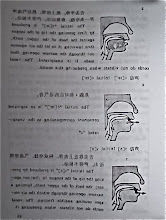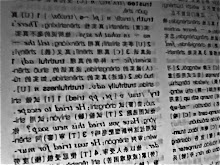IV.
The scientific method as formulated by Descartes
has its origins, obviously, in orthopraxy
and has everything to do with God.
Charlemagne's prescribed sequence of motion
makes the fact quite plain: arriving at truth
is a ritual. Charlemagne would unsheathe his sword,
which heavy-hilted blade he was never without,
consider the reflection of the lambent flames
on the metal for awhile, and gently lay it across
his bureau on top of his loosely organized stack
of memos, invoices, and manuscripts.
The emptied sheath still girded to his hip,
Charlemagne would then pace in silence for,
as Alcuin determined, exactly 51 steps.
Yes, Alcuin was a compulsive hoarder of
figures, and is said to have first discovered
(for himself, not for all mankind, to be sure)
that 51, despite its looks, is not a prime number.
Alcuin could easily discern Charlemagne's affinity
for the number 3...but 17? This would cause
Alcuin to lose some sleep.
To have a knack for numbers, as we now know,
is to have a knack for God, which knacks
Alcuin had. He kept precise, nay, fastidious
tallies of the local sports teams:
wins, losses, ties, of course, but many other
hieroglyphic statistics such as arrow-to-target ratios
and lance/visor averages. In this, Alcuin anticipated
two of the most important inventions since the death of Christ:
baseball record-keeping and algebra.
Muslim scholars, not so incidentally, were way ahead
of the Europeans on the latter with al-jabr—
"the mending of broken bones," and thus "reunion,"
which allowed for the synthesis
of the rational and the irrational. Through numbers,
surely, but more profoundly, in some great theophanic
insight, through a way of seeing God.
At this point, Charlemagne: Let us retire to the stable.
The King re-sheathed his sword; Alcuin tucked parchments
under his arm. And both were the same gestures.
On their way, the pair picked up a chaliced cocktail to-go,
and, for the sake of the good form, would humor
a servant to escort them through a labyrinthine route,
a different servant and thus a different route each time,
up newel stairs through the curtain walls to the allure,
under which gemmed firmament all men
must disrobe the various fashions and accessories
of disagreement to stand, wonderstruck, as one
to pledge their allegiance to the stars.
Here, Charlemagne would place his drink
in an ope of the crenellations and remove his sword
once more. Then to enact an intricate and elegant
folk dance of swordwork.
There was a Northumbrian rhythm to it, which warmed
Alcuin with nostalgia, though he couldn't fathom
where Charlemagne picked it up so fluently:
accents, as they say, are the greatest
challenge in acquired multilingualism.
So Alcuin watched and could only speculate what
Charlemagne thought each time he swung
the blade in arcs that doubled the man's height;
according to his face, Alcuin concluded,
widows and orphans.
After some time, enough time for some star
to travel some distance larger than any man
could ever hope to count, a heavy-breathed
Charlemagne returned his broadsword
and, no louder than in his voice of conversation,
called for a servant. A different one, of course, quickly
arrived to lead the two down the far curtain
to the stable at the end of the stables,
whose rafters the King had his court architect
adjust to accommodate Abu l'-Abbas:
the Emperor's beloved elephant,
in whose presence Charlemagne would begin
the dance of the tongue, to utter
the language of the puzzle.



No comments:
Post a Comment